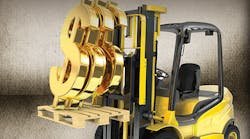This month we are announcing the results of the MH&L 2016 Salary Survey. After you've taken the time to identify how much your peers are making (and how much you think you should be making), check out some of the other data we've collected. Besides all the money stuff, our survey is designed to also focus on the daily challenges and accomplishments that occupy the worklife of material handling and logistics professionals.
Our cover story reveals that job satisfaction is at its highest level in several years, with 73% of respondents saying they are either satisfied or very satisfied with their current jobs. Even so, 60% say they are open to the idea of changing jobs if the right opportunity came along. So "satisfaction" doesn't necessarily mean "inseparably attached."
One interesting change from last year to this year is the increasing importance of base salary to respondents. In 2015, 25% said that job stability was what mattered most to them about their jobs, with base salary coming in second at 19%. This year, base salary was again in second place at 19%, but job stability was just barely ahead, with 20% of responses. Part of the explanation could be tied to 30% of all respondents saying they didn't get a raise last year, 33% saying they don't expect to get a raise this year, and another 46% saying they expect a very modest raise, in the 1-3% range. When you add to the mix that 23% received no bonus last year, and another 11% received less than $1,000 as a bonus, then you can better understand why there are a quite a few disgruntled managers wondering why an improved economy isn't being reflected in their pay stubs.
A common complaint among respondents is that they feel overworked, and a look at the survey results offers some reasons why that might be. For one thing, 24% of the respondents say their companies reduced staffing over the past year, and another 29% had no change in staff size. In other words, more than half (53%) know first-hand what it means to "do more with less" every day of the week. And the shrinking-staff-size dilemma might not necessarily be solely due to a company not wanting to invest in personnel. Sixty-three percent of respondents say their companies struggled to fill a position in the past year due to a lack of skilled candidates.
Little wonder, then, that quite a few respondents expressed concern about their companies' reluctance to invest in technology upgrades. In fact, almost half (48%) see automation and technology as having a huge or significant impact on the size and makeup of their workforce over the next three years.
We invited respondents to share with us what one thing they would change about their jobs if they had the power to do so. Below is just a sampling (you can see all of the comments at the end of this editorial), which provides a pretty good snapshot of the types of things that are most important to your fellow material handling and logistics professionals:
- To be able to work for a company committed to the use of technology for the betterment of the business.
- Additional time spent in other industries to see how they are adapting to new technologies.
- More control within the facility because I find that shipment timeliness is frequently outside my realm of control.
- Being able to mentor others to enter our industry.
- Getting senior management's support/understanding of the importance of creating the right network to support the growth of the business.
- Less focus on short-term results and more emphasis on mid- to long-term actions.
- I have too many projects on my plate. I would like to focus on one or two, rather than four or five.
- Work with people who really care about what they are doing.
Just as the goal of supply chain management is to get the right products delivered to the right place on time, the goal of those who manage the various supply chain processes are committed to having the right people in place to make it happen—reliably, consistently and profitably. And based on the responses to this year's Salary Survey, material handling and logistics professionals are also committed to continuous improvement—doing their job better today than they did yesterday. The industry clearly is in good hands.
*
Following are the responses to the MH&L 2016 Salary Survey question: If You Could Change One Thing About Your Job, What Would It Be?
401(k).
A company vehicle and gas card.
Ability to advance.
Ability to spend more time with customers.
Ability to spend more time with each staff member.
Accept more workload and higher responsibilities.
Add enough staff to stay focused on the work that needs to be done.
Add sales pros.
Add staff.
Additional management and supervisory opportunities.
Additional personnel in the department.
Additional time spent in other industries to see how they are adapting to new technologies.
Additional training for staffing.
Advancement opportunities.
Automate handling.
Automation.
Base salary.
Be able to complete tasks before interruptions intrude and have to be dealt with. (Once in a while is expected, it happens too often to me.)
Being able to mentor others to enter our industry.
Better communication.
Better computer system than what we have.
Better health benefits.
Better position.
Better time management.
Better training.
Boss.
Career advancement opportunities.
Change in leadership/different boss.
Closer to home (I have an hour commute to and from work each day).
Communication.
Company policies.
Company recognition and understanding of quantity and difficulty of work.
Compensation.
Confidence in the customers about the quality of services.
Corporate structure.
Crazy hours.
Cross-functional team focus on improvements.
Cut the layers of management.
Decentralized decision-making.
Decrease commute time.
Decreased daily workload.
Economic growth of at least 5% nationally.
Eliminate the fluff work—let my team and I perform our work without having to do the paperwork.
Executive management more engaged with the operations they manage.
Expanded customer base, with a better appreciation for cloud solutions and their advantages.
Faster implementation of new technology.
Feeling like a contributor, even as an older worker.
Fewer meetings.
Flexibility.
Flexibility to adopt new technologies. Have a defined corporate strategy. Equality between ethnicities.
Flexible hours.
Flexible schedule.
For the company to do a better job of establishing and sticking with priorities, even the projects that are not quick-and-dirty.
Four 10-hour days instead of five 10-hour days.
Freeze time.
Geographic location.
Get new tech services and devices.
Get paid for what I am doing for this company.
Get some help.
Getting a WMS system.
Getting better pay.
Getting respect.
Getting senior management’s support/understanding of the importance of creating the right network to support the growth of the business.
Give managers more flexibility and reward them for good performance.
Greater communication with departments.
Greater visibility of what is happening with the inventory.
Have a few more layers to handle in the corporate structure.
Have more time off.
Have skilled material handling positions and all logistics positions be held by people with training in logistics.
Have the tech/engineering/IT support needed to continue to grow and refine our proprietary WMS.
Having capital funds to pay for upgrades in equipment as needed.
Having qualified people to hire.
Having the kind of help that I could take a vacation and not have to worry about what I would come back to.
Having to meet or take phone calls from sales people.
Help with staffing.
Higher base salary.
Higher wages.
Hire an administrative assistant.
Hours of operation.
Hours of service.
Hours/workload.
How to plan the raw material and the customer orders.
I have too many projects on my plate. I would like to focus on one or two, rather than four or five.
I should get a bonus.
I would be in charge of operations.
Improve communication from senior management down.
Improved information systems.
Improvements to supply chain.
Improving communication.
Income.
Increase base salary.
Increase budget for training.
Increase business.
Increase the company’s emphasis on growth.
Increase the perceived value of logistics in the company.
Increased flexability.
Increased permanent staff.
Independence and professionalism of salespeople.
IT development.
Keep sales department away.
Leadership.
Leadership that listens and is willing to invest in needed infrastructure.
Less e-mail.
Less focus on short-term results and more emphasis on mid to longer term actions.
Less hours.
Less interference by those who don’t know who are higher ranking then myself.
Less paperwork.
Less pressure.
Less stress.
Less talking, more facts.
Less time traveling.
Less travel.
Less working hours in a week. More time for family.
Lighten the workload.
Local control vs national control.
Location.
Long-term planning.
Make more money.
Management culture.
Manager.
Managing the pettiness that sometimes happens when managing people.
Mentor and delegate more.
Micro managers.
More access to field staff.
More awareness of challenges.
More challenging projects.
More contracts.
More control within the facility because I find that shipment timeliness is frequently outside my realm of control.
More control.
More direct operations control.
More flexibility.
More flexible work schedule.
More hands-on.
More innovations.
More international.
More involvement in long-term corporate decisions.
More leadership.
More money.
More opportunities for career advancements.
More pay.
More recognition.
More revenue that trickles down to more spending for R&D and employee benefits.
More support from upper management.
More support staff to handle administrative functions.
More time for training.
More time to do the job correctly—always a last-minute rush.
More time to think.
More flexibility with hours.
More training support/budget for training.
More travel.
More vacation.
More work in direction of supply chain metrics.
My boss.
My pay.
Not dealing with the returns.
Nothing.
Opportunity for more time off.
Organization.
Ownership/leadership.
Pay.
Payroll.
Physical location.
Pressure.
Promotion/income growth.
Proper compensation for the hours put in.
Quality.
Quieter work surroundings.
Quit.
Recognition.
Reduce stress.
Replace upper management.
Respect.
Responsibilities.
Salary.
Salary/bonus structure.
Schedule.
Shorter hours.
Skill development.
Sometimes the front office tends to micromanage things a little too much.
Span of control.
Stability in sales.
Status.
Stop the relocation.
Stress level.
Stronger structure within the organization.
Structure.
Supporting multiple divisions operating on different systems. I’d like all divisions to run on the same system.
Talent recruitment pool for potential new hires to be greater.
Technical support.
That management acknowledges exactly what I do and me not having to justify my time. Safety and compliance is a thankless job.
The amount of control I have surrounding warehouse and scheduling of loads.
The amount of regulations. The resulting paperwork time sink.
The amount of work I manage.
The hours.
The logistics to deliver products to customer.
The owner.
The people.
The perceived (and real) value to the company that supply chain management brings to the table.
The reporting structure.
Time off.
Time to complete an action.
Title change.
To be able to work for a company committed to the use of technology for the betterment of the business.
To delegate more of my responsibilities to take on more creative aspects of the business.
To have more authority and be accepted as an equal.
To have more time to devote to OSHA and HR duties.
Training.
Transportation management systems.
Travel less.
Upper management.
Weekends off.
Work fewer hours.
Work just 40 hours a week.
Work/life balance with flexible time with family.
Work load.
Working fewer hours.
Working to get remunerative rates for services.
Work with people that really care about what they are doing.
Workplace dynamic.
Would focus on quality of resources and equal opportunity and support to all our resources.
Would like more autonomy without having to report to office on a daily basis.
Would like more involvement in all locations.
Would like to keep busier.





